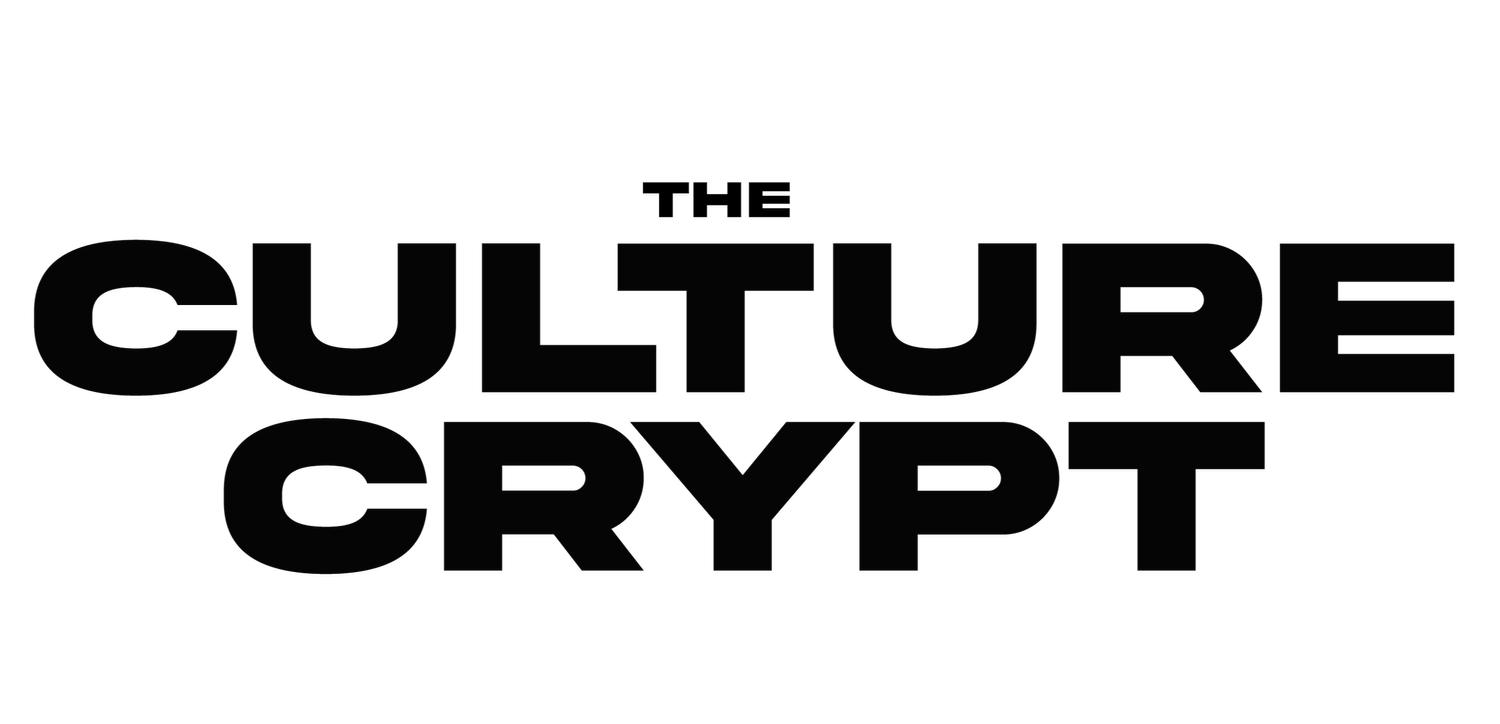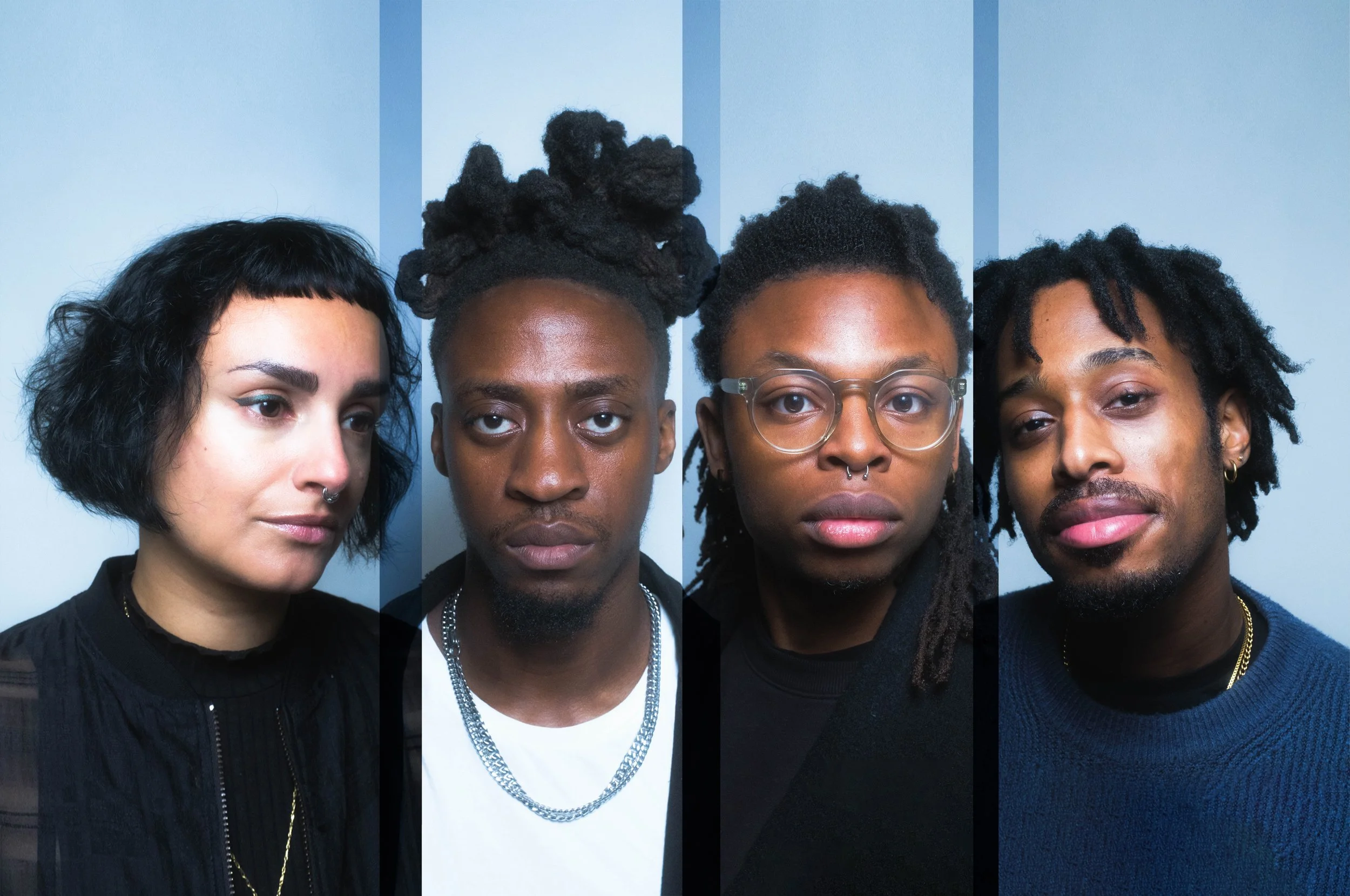"We just finished a tour with Slowdive": Rising Rock Quartet Whitelands Discuss the Future of Shoegaze and Black Identity
The Culture Crypt meets Whitelands—a band blending ethereal melodies with poignant narratives. We discuss their critically acclaimed debut album, tour and much more.
"It's still unbelievable now to think that we just finished a tour with Slowdive," laughs the band's bassist Vanessa Govinden, adorned in a kitsch space-age webcam filter. Talking with the four-piece Whitelands across multiple screens, the band disperses, with each member occupying their own digital space over an afternoon video call.
Drummer Jagun Meseorisa, walks the cityscape during the interview as the rest of the band nerd out with one another in deep music conversation. It's clear to see that despite the physical separation of Whitelands after an intensive UK tour together, their collective enthusiasm to discuss their latest album, Night-Bound Eyes Are Blind To The Day, is unmistakable.
Founded by the lead singer and guitarist Etienne Quartey-Papafio in 2017 and later joined by drummer Jagun Meseorisa, Whitelands found their niche in the moody London D.I.Y circuit by bridging the gap between alternative music and POC communities. Vanessa recollects, "There is a non-profit DIY festival called Decolonise, and I was there in another band while Whitelands were playing with a slightly different sound. They had just lost their previous bassist, so I introduced myself and expressed my interest in playing with them. From that moment on, I've never left the band."
The current line-up, drawing influence from classic '90s shoegaze, guitar pedals, and euphoric noise-making, makes collaborating with Simon Scott (Slowdive) on the record feel like the ideal match for the band.
As Etienne delves into the account behind their legendary Slowdive tour—a tale bound to etch itself into the band's history—a youthful smile warms his face over the video call. "The band were actually fans of ours!" he enthuses. "Simon Scott, the drummer of Slowdive, attended one of our gigs and really enjoyed it. Afterwards, he offered to master our album."
Night-Bound undeniably channels the essence of Slowdive's Souvlaki, with the shimmering shoegaze influences on the debut record shining through like mirror-like stars on a lusterless sky. However, despite these influences, Whiteland's debut album walks bravely alone in the open world.
While the music genre has achieved many groundbreaking heights in British popular culture, it's uncommon to find shoegaze paired with any political monologue, unlike the raw intensity heard in modern post-punk or the narrative critique of world affairs in hip-hop. Shoegaze leans more towards the daydreams of otherworldly escapism and etherealism, typically centring itself around the vocals, submerged in a cacophony of reverb, effects, and noise. Whitelands, however, are a shoegaze band deeply rooted in their experiences as Black artists.
Drifting deep beneath lush layers of technicolour guitars and hypnotic, blinding melodies, Night-Bound Eyes Are Blind To The Day's political themes delicately unfurl like pastel sugar paper, slowly opening up the diverse experiences and narratives of the young Black diaspora.
The track "Setting Sun" is a stand-out album that reflects on the tumultuous times during the 2020 lockdown. Etienne elaborates, "In the aftermath of George Floyd's murder, the song looks into the shifting dynamics of racial discourse and the conversations people were having whilst they were just sitting at home online. Even within my own circles, the friendship groups where such discussions weren't had before, suddenly were being had. There was a noticeable shift towards blatant racism. There were people sharing opinions that I would have never thought they would. It was a challenging period to exist as a Black person."
When questioned about whether Whitelands functions as a cathartic project to discuss their shared experiences as Black artists or whether it is merely a vessel for their music, the band pauses in reflection.
Jagun explains that for artists of colour, engaging in political conversation isn't a choice but rather an inherent part of their day-to-day narrative without the ability to opt out. "It's in our album name. The title of our album was inspired by a passage from Khalil Gibran's The Prophet novel—'The owl whose night-bound eyes are blind unto the day cannot unveil the mystery of light.'
"When you consider the themes we explore in the album, in our political debate, we interpreted that quote to mean those who choose not to see - will not see."
Expanding on that quote further, Etienne offers more insight with "Now Here's The Weather" and its lyrics: "And what of loving? And what of peace? My bible commands, it's wrapped in green. / Let's love thy neighbour, let's burn their house. [...] I'll kill you to bring you peace."
"When I wrote that song, the current world politics was in mind. It's about colonialism; it doesn't matter what race you are—colonialism exists. It's so ingrained in the system, even in the media, shaping our thoughts in certain ways. This song was crafted to symbolise how nationalism can be effectively marketed; it's used to justify horrendous political beliefs or even racism. It's a horrifying reality to me."
Taking a step back from the political discourse to briefly explore the band's creative music process and the world behind the politics, they provide a window into their evolution as a band, and the origins of Night-Bound Eyes Are Blind To The Day.
While some parts were recorded in a studio with Ian Flynn from Werkhouse, a London-based music producer, who also took on the task of mixing the album—the guitars and bass were mainly recorded DIY within the confines of their homes, using the DAWs and audio interfaces in classic bedroom-pop style.
In joint laughter, the band opens up about the eclectic mix of influences that shaped the recording process of their album. Each member excitedly shares their personal favourites, with Jagun confidently listing Paramore and Wolf Alice among his top inspirations while also expressing his bewilderment at the hate aimed towards Coldplay. "Their first two albums are so good," he adds, prompting the other Whitelands members to scoff over the video call. "But seriously, my Paramore influence shows in the songs 'Chosen Light' and 'How It Feels'."
Each member reveals slightly different tastes, with Etienne sharing his love for the dream pop era of the 2010s with bands like Beach Fossils, Wild Nothing and Turnover, heard in his guitar playing and songwriting.
Vanessa passionately discusses her recent re-discovery and love for Deftones. She explains: "I love their basslines and my bass-playing is similar to Chi Cheng, with that Deftones sound—they are heavy but there is beauty in their music. I find them really inspiring for the balance they have. I think you can hear that on our record. As a bass player my influences have also been Unwound and Shellac. I was listening to a lot of the album Marked For Death by Emma Ruth Rundle when we were recording."
In a reflection on his upbringing, Jagun highlights the pushback he faced for embracing rock music as a Black kid—a genre often perceived as distant from the cultural norms of the Black community. "Growing up, you'd get hate listening to rock music as a Black kid, from both sides.
Now, it's finding its way into Black mainstream music and I find that interesting that now we are accepting that again as something that's okay to do," he observes. "It was really heart-warming and humbling to see how many POC and young women took inspiration from seeing us supporting Slowdive and showing that these opportunities are possible for them, too. I'm really excited to continue doing that."
In a thought-provoking discussion on the vital importance of having inclusive spaces for Black and POC youth to explore alternative music, Vanessa passionately reaffirms Jagun's thoughts. She articulates, "I always say that I wish I had seen a band like Whitelands when I was younger - representation is so important, and we're here for it."
The band shared their opinions on Whitelands' future, both in terms of their musical evolution and their influence on the industry and societal awareness. "It's a slow burn." Vanessa expresses. "It's taken seven years to get to where Whitelands is. We'd love to continue on a steady but healthy upwards trajectory, work on an EP or second album, and play a small headline tour."
"We've achieved so much as a band being independent and DIY. On the whole, the music industry still needs to diversify. There's a lot of regurgitating past genres and trends because it made money back then, and it's comfortable and safe to bring back for the big labels as it's easier to market. It's safe. There are some really cool collectives out there making positive change, and it's working," says Vanessa.
Whitelands, with a post-modern Black lens, carve a path for newcomers in the shoegaze genre. And whilst they express that their journey may at times feel difficult, Night-bound Eyes Are Blind To The Day blooms in its sense of direction, masterfully harmonising the experiences of Black artists with the swirling highs of shoegaze.
Alongside exploring themes of social unrest and racial tension, it's evident that as a band, Whitelands draws strength and authenticity from their own world—a quality that distinguishes them as one of Britain's most intriguing and promising new acts, with an outstanding debut album.
Stream Whitelands' Night-Bound Eyes Are Blind To The Day album below:



